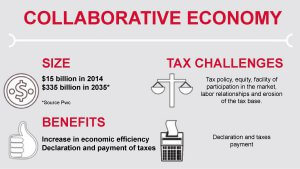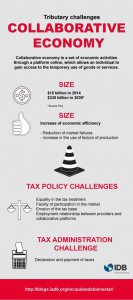The collaborative economy and the challenges for tax policy and tax administration

What is the collaborative economy?
Uber, Airbnb and Snapgoods are part of what has been called collaborative economy, a set of economic activities performed through online platforms, which allows an individual to gain access to the temporary use of goods or services.
 Transactions in the collaborative economy typically involve individuals (companies do not usually participate) and do not involve a change in the ownership of assets (in contrast to what happens with online commerce). Although the size of the collaborative economy is relatively small, with global revenue estimated by Price Waterhouse Cooper (PwC) at $ 15 billion in 2014, their growth has been exponential. PwC estimates that the size of the collaborative economy would reach $ 335 billion in 2025.
Transactions in the collaborative economy typically involve individuals (companies do not usually participate) and do not involve a change in the ownership of assets (in contrast to what happens with online commerce). Although the size of the collaborative economy is relatively small, with global revenue estimated by Price Waterhouse Cooper (PwC) at $ 15 billion in 2014, their growth has been exponential. PwC estimates that the size of the collaborative economy would reach $ 335 billion in 2025.
The collaborative economy has generated much interest for its potential to increase economic efficiency, since the platforms significantly reduces the gravity of certain market failures. One of the major frictions that it reduce it the matching. I.e., these platforms make easier that providers, or suppliers of the good or service, find buyers and vice versa. It also allows reducing problems of asymmetric information, through the introduction of a system of qualification of suppliers and buyers. In addition, competition can be increased to facilitate comparison of prices and products.
On the other hand, the collaborative economy also has the potential to increase the levels of production of an economy, allowing a more intensive use of the production factors, mainly capital goods, but also labor. People who cannot or do not wish to take a traditional job can expand their opportunities through the more flexible work arrangements offered by the collaborative economy.
The collaborative economy implies an important break with respect to traditional business models. A consequence of this change in the business model is that the current legislation on competition, protection of the consumer, labor relations, and taxation does not adapt correctly to this new context. In this article, we focus on the challenges of the collaborative economy for the tax policy and tax administration.
Collaborative economy and the challenges for the tax policy
The main challenges of the collaborative economy for the tax policy relate to issues of efficiency and equity. As regards efficiency, although there are several challenges, two are worth being highlighted: equal tax treatment and facility of participation in the market.
In relation to the tax equality of treatment, the tax policy must ensure that activities and equivalent income are taxed in a similar way, independent of the business model, in order to avoid distortions in the allocation of resources between models of business because of tax advantages. An example of unequal treatment is currently given in many cities of the world in the markets of hosting services, as a result of the tourism taxes. While hotels must pay specific taxes on their income, up to 20% in some cities, collaborative economics income might not be taxed, creating an advantage for the latter.
In regard to the ease of participation in the market, it is important to consider that many bidders in the collaborative economy are involved sporadically and for short periods of time. If a service provider has to register or change his tax regime to formally participate in the collaborative economy, this may discourage their participation, negatively affecting the economic efficiency. In this way, it could be desirable that tax legislation provides for the model of the taxpayer who carries out an economic activity in a sporadic manner and introduce exemptions or simplified methods of tax payment for such taxpayers.
 Several countries have already introduced or have proposed changes in this regard. In the United Kingdom, for example, there is no tax to be paid for the first 7,500 pounds of income obtained from renting a room. Moreover, Italy has already proposed an amendment to the tax law that contemplates the exemption of invoicing when the collaborative economic activity is non-professional and is below an invoicing threshold. While it may be desirable to introduce simplifications that reduce administrative costs, these should, as much as possible, to avoid introducing an unequal treatment and avoid creating special regimes with provisions that apply exclusively to the collaborative economy.
Several countries have already introduced or have proposed changes in this regard. In the United Kingdom, for example, there is no tax to be paid for the first 7,500 pounds of income obtained from renting a room. Moreover, Italy has already proposed an amendment to the tax law that contemplates the exemption of invoicing when the collaborative economic activity is non-professional and is below an invoicing threshold. While it may be desirable to introduce simplifications that reduce administrative costs, these should, as much as possible, to avoid introducing an unequal treatment and avoid creating special regimes with provisions that apply exclusively to the collaborative economy.
Are Uber drivers employees of the platform?
In addition, important issues of efficiency and equity are generated in the employment relationship between service providers and the collaborative platform. There is, for example, a debate about whether über drivers should be considered employees or are self-employed. This is important mainly because of the resulting obligation that the platform would have to make social security contributions, as well as to enforce the applicable tax withholdings.
Generally, the platforms argue that they are not employers and that their drivers work on their own. However, at the end of 2016, a Labor Court in the United Kingdom found that according to their labor legislation, Uber drivers are employees of the platform, a decision which is being appealed by Uber. The Court’s decision was based on several factors, including that Uber interview and recruit workers, instructs them how to do their jobs and force them to charge a specific fee.
Given that many labor laws define the relationship of dependence based on supervision, control and direction that the company makes about the tasks performed by the worker, this creates an incentive to create a certain “distance” between the platform and the services providers, which can adversely affect service quality and growth potential. For example, to create the perception of a sense of distance, it is possible to stop training the providers or reduce the supervision, affecting the quality of the service.
Collaborative economy and tax base erosion
Finally, tax policy should seek to reduce the possibility of platforms located abroad to erode the tax base via the transfer of benefits to countries with low corporate income taxation. This phenomenon can generate significant revenue losses. For example, in 2015, Airbnb paid taxes in Spain for a total of 81,000 euros, despite managing more than 35,000 houses for rent. This is because Airbnb has only one subsidiary in Spain, Airbnb Marketing Services, which acts only as a marketing agency. The subsidiary invoices advertising services to the matrix, obtaining by these modest services revenue. For the business income generated in Spain, Airbnb pays tax in Ireland, where are located its headquarters for Europe. This country has a low corporate income tax.
Challenges and opportunities for tax administration
In addition to the challenges mentioned for the tax policy, there are significant challenges to the tax administration. The main challenge in the short term is to ensure that the providers declare their incomes in the collaborative economy and pay their taxes in accordance with the legislation in force. Lack of disclosure and payment of the tax may be due to ignorance or uncertainty about taxes that have to be paid, as well as a lack of willingness to pay. Given that the tax legislation has its foundations in the traditional business models, both economic operators and tax authorities may not be sure of the corresponding obligations. This is due to an insufficient understanding of how tax rules should apply to the specific activities of the collaborative economy, since new technologies have the potential to dilute the differences between consumer and supplier, employer and self-employed, professional and non-professional services, among others.
To resolve this problem of uncertainty, several administrations have established standards to address the problems in a coherent way and several countries have made progress in the implementation of different strategies for facilitating the voluntary compliance with tax obligations.
Some countries, such as United States, Austria and Hungary, have published answers to the most frequently asked questions on their tax administrations’ websites. Other tax administrations have taken further steps, generating a direct relationship with the platforms. This relationship may have intended the gathering of information for the control, or obtain from them to act as withholding agents or facilitators of compliance.
Relationship between tax administrations and collaborative economy platforms
As an example of withholding agent, we can mention the case of the city of Amsterdam, which has reached an agreement with Airbnb to make it withhold the tax tourism. France, for its part, changed its legislation to allow the platforms to be withholding agents. With regard to the facilitation of compliance, France requires platforms to send annually to each individual who provided services in the collaborative economy a summary of their income generated, indicating in addition how much must be paid for the different taxes. Meanwhile Estonia, taking advantage of the traceability of the information of the collaborative economy, requires from the platforms of transport services information about the services provided by their affiliated drivers. This information is then used for pre-filling the tax returns for the taxpayers, allowing them to meet their obligations with minimum effort.
Final considerations
The collaborative economy has the potential to generate different business opportunities, with benefits both for workers and consumers. The improvement in the allocation of resources may lead to increases in productivity. New work opportunities, flexible working arrangements and new sources of income can also help to increase employment and reduce poverty and informality.
Given the potential of the sector for the well-being of the citizens, it is important that taxes do not become an obstacle for the development of collaborative economies. Authorities related to the tax policy and tax administration should seek to simplify tax compliance in this sector, minimizing the negative effects on traditional business models. In this sense, it is important to develop a close coordination between tax administrations and platforms. This also requires a permanent joint effort, given that the steady progress in the technology requires continually updating or renovating the tax policies for the sector. Although this represents a great challenge, the potential of the sector justifies it.
This article was originally published on the IDB website
2,752 total views, 1 views today
